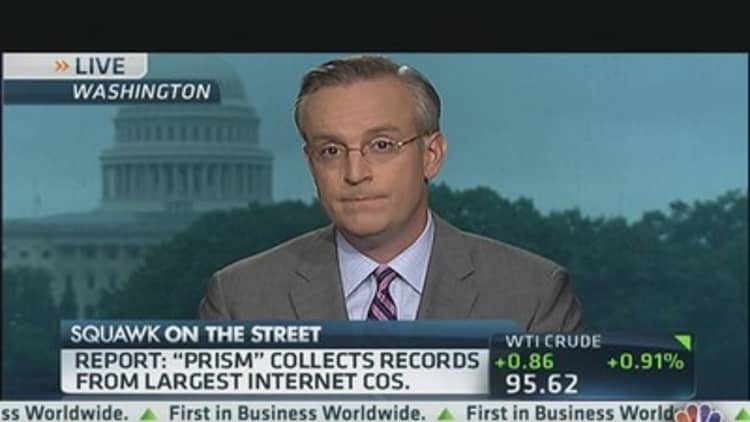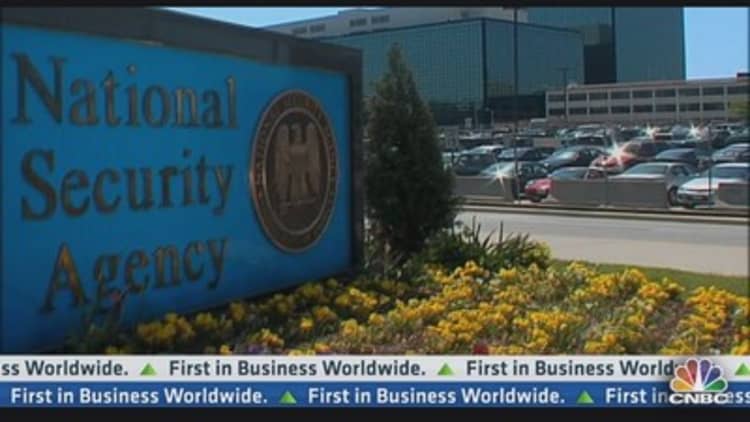WASHINGTON — A 29-year-old former technical assistant for the Central Intelligence Agency was the source for a series of recent disclosures about the government's collection of huge amounts of private Internet and telephone data, the British newspaper The Guardian revealed on Sunday.
The Guardian identified the source as Edward Snowden, who has worked at the National Security Agency for the last four years as an employee for various defense contractors. He has most recently worked for Booz Allen Hamilton, a defense contractor, the newspaper said.
The Guardian said it was revealing Mr. Snowden's identity at his own request. In an interview with the newspaper, Mr. Snowden, who is currently staying in a hotel in Hong Kong, said he expected that the American government would seek to prosecute him for disclosing top-secret documents detailing the Obama administration's extensive surveillance program.
"I have no intention of hiding who I am," he was quoted as saying, "because I know I have done nothing wrong."
Mr. Snowden's disclosures to The Guardian and The Washington Post over the last week have reignited the long-smoldering controversy over the scope of government surveillance of American citizens, which appears to have expanded substantially since the terrorist attacks of Sept. 11, 2001. In recent days, the Obama administration and other proponents have defended the surveillance program, revealing that it had helped to thwart terrorist plots, in order to bolster assertions that such data collection was necessary to keep Americans safe.
Others though, have accused the president of abandoning pledges made as a candidate and early in his presidency to roll back the surveillance architecture created by the administration of George W. Bush.

The stream of disclosures began on Wednesday with the publication of a highly classified court order directing a Verizon Communications subsidiary to turn over call logs between the United States and abroad to the National Security Agency. That was followed by the revelation of a program, known as Prism, that collects Internet data on foreigners abroad from companies like Google, Facebook and Apple.
The Guardian also published a classified directive laying out the conditions under which the president could order cyberattacks against another country.
In a video accompanying the Guardian article, Mr. Snowden seemed slightly tense but articulate and well spoken. He wore glasses, a dark gray shirt open at the neck, and had a slight growth on his chin and upper lip.
Asked what fears he might have about his future, he said, "I could be rendered by the C.I.A., I could have people come after me."
"We've got a C.I.A. station just up the road in the consulate here in Hong Kong, and I'm sure," he said with a nervous laugh, "that they're going to be very busy for the next week, and that's a fear I'll live under for the rest of my life."
He said he came to Hong Kong, an autonomous Chinese territory, because he believed it was independent and had "a strong tradition of free speech."
"The people of Hong Kong have a long tradition of protesting in the streets, of making their views known," he said in the video interview. "The Internet is not filtered here, no more so than in any other Western government."
But Mr. Snowden said that when facing what he called this "architecture of oppression, you realize that you might be willing to accept any risk."

Details about Mr. Snowden's background could not be immediately confirmed.
But speaking to The Guardian, Mr. Snowden described himself as a patriot who had become disillusioned by his experiences as a soldier in Iraq and later as a C.I.A. employee overseas.
The Guardian described him as a high school dropout, whose first career with the intelligence community was as a security guard at a National Security Agency facility at the University of Maryland. In 2009, he joined the N.S.A. as a contractor at a facility in Japan, where he said he watched "as Obama advanced the very policies that I thought would be reined in."
The Guardian said that Mr. Snowden was working at the N.S.A. office in Hawaii three weeks ago when he made final preparations to disclose the classified documents. It said he copied the documents, and then told a supervisor that he needed to take a few weeks off to deal with some medical problems. He then flew to Hong Kong, where he remains.
Booz Allen, in a statement, said Mr. Snowden had been an employee for less than three months and was assigned to a team in Hawaii.
"News reports that this individual has claimed to have leaked classified information are shocking, and if accurate, this action represents a grave violation of the code of conduct and core values of our firm," the company statement said.
Mr. Snowden said that he admired both Daniel Ellsberg, the source of the Pentagon Papers, and Bradley Manning, the Army private who has acknowledged providing huge troves of government documents in the WikiLeaks scandal.
But he drew a contrast, saying that he carefully evaluated the documents he disclosed to ensure no people would be harmed and the public interest served.
"Anybody in positions of access with the technical capabilities that I had could, you know, suck out secrets to pass on the open market to Russia," he said. "I had access to the full rosters of everyone working at the N.S.A., the entire intelligence community and undercover assets all around the world — the locations of every station we have, what their missions are."
"If I had just wanted to harm the U.S., you could shut down the surveillance system in an afternoon."
Brian Knowlton reported from Washington and Michael Schwirtz from New York.

